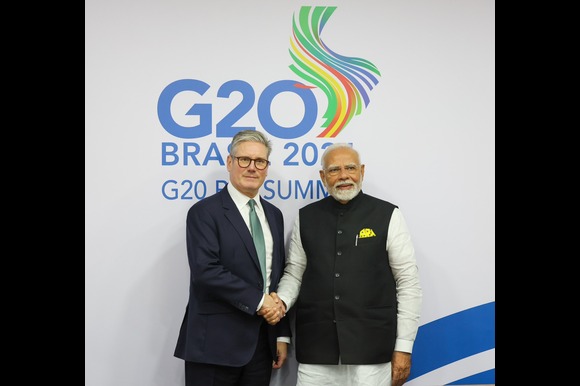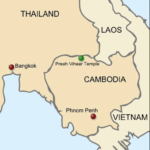In a landmark move hailed as the most significant trade deal since Brexit, Indian Prime Minister Narendra Modi and UK Prime Minister Sir Keir Starmer have signed a long-anticipated free trade agreement, promising a multi-billion pound boost to exports and closer ties between the two nations.
Under the agreement, UK exports such as cars, whisky, aerospace parts, medical devices, and cosmetics will face lower tariffs in India, while Indian exports including textiles, jewellery, footwear, seafood, and engineering goods will enjoy improved access to the UK market. British staples like lamb, salmon, chocolates, and biscuits will also see reduced duties, as will gin and whisky—whisky tariffs alone will fall from 150% to 75% immediately, and down to 40% by 2035, giving the UK a strong edge over global competitors.
Indian manufacturers, in turn, are set to benefit from access to the UK market for electric and hybrid vehicles. The deal will reduce average tariffs on UK exports to India from 15% to 3%, significantly improving British companies’ ability to compete in one of the world’s largest and fastest-growing markets.
The agreement, finalised at the UK Prime Minister’s countryside residence of Chequers, follows three years of complex negotiations that began under Boris Johnson’s government in 2022. Sir Keir called it “the biggest and most economically significant” trade agreement Britain has struck since leaving the European Union.
“This deal is now signed, sealed, delivered,” said Sir Keir. “The UK has been negotiating a deal like this for many years, but it is this government that got it done. We’re sending a very powerful message that Britain is open for business.”
The UK government says the agreement will add £4.8 billion annually to the British economy and create over 2,200 new jobs across the country as Indian firms increase investment and UK businesses expand operations in India.
Sir Keir emphasised that the deal was only part of a broader, long-term vision: “This trade deal is not the extent or the limit of our collaboration with India. We have unique bonds of history, of family, and of culture—and we want to strengthen those even further.”
Prime Minister Modi echoed that sentiment, calling the deal “a blueprint for our shared prosperity.” He highlighted the mutual benefits: “On the one hand, Indian textiles, footwear, gems and jewellery, seafood, and engineering goods will get better market access in the UK. On the other, people and industries in India will be able to access UK-made products, such as medical devices and aerospace parts, at affordable and attractive prices.”
Although the deal has been approved by India’s cabinet, it still awaits formal approval from the UK Parliament and is expected to take at least a year to come into force.
Beyond trade in goods, the agreement outlines deeper collaboration on defence, education, climate change, technology, and innovation. It includes enhanced intelligence sharing and operational coordination to tackle serious crimes such as corruption, organised crime, and irregular migration.
A new criminal records sharing agreement is being finalised, which will support law enforcement, maintain accurate watchlists, and aid in enforcing travel bans.
The deal also includes a controversial provision allowing temporary workers from both nations to pay social security contributions only in their home country. The Indian government described this exemption as “an unprecedented achievement” when the deal was agreed in principle in May.
Critics had raised concerns that this arrangement could undercut British workers. However, UK Business Secretary Jonathan Reynolds rejected those claims, saying Indian workers on secondment would not enjoy any tax advantage. “There is no tax advantage for hiring an Indian worker over a British worker,” he told BBC Breakfast. “In fact, you’d actually pay more for an Indian worker due to extra costs like visas and the NHS surcharge. No-one is being undercut.”
Reynolds also noted that similar social security agreements already exist between the UK and 17 other countries, including the US, South Korea, and members of the EU.
The deal does not grant the UK as much access to India’s financial and legal services sectors as it had hoped. Negotiations continue on a separate bilateral investment treaty aimed at better protecting investments from both sides. There are also ongoing discussions about the UK’s proposed tax on high-carbon imports, which India has argued would disproportionately affect its goods.
During the bilateral talks, Prime Minister Starmer is understood to have raised the case of Jagtar Singh Johal, a Scottish Sikh activist imprisoned in India since 2017 on terrorism-related charges but not yet convicted. His family and legal representatives have urged the UK government to secure his release, though India has maintained that legal due process is being followed.
This visit marks Modi’s fourth trip to the UK since taking office in 2014. It comes a year after he and then-Foreign Secretary David Lammy signed the UK-India Technology Security Initiative, aimed at deepening cooperation on telecommunications security and emerging technologies.
Reactions to the deal have been mixed across the UK political spectrum.
Conservative shadow business secretary Andrew Griffith said the deal was only possible “because of Brexit delivered by the Conservatives” and described it as “a step in the right direction.” However, he warned that any gains could be undone by what he called “Labour’s union charter,” criticising Deputy Prime Minister Angela Rayner’s pro-worker policies and claiming they would “stifle business with red tape” and “punish Britain’s makers.”
In contrast, Liberal Democrat foreign affairs spokesperson Calum Miller blamed Brexit for harming the UK economy and called for a new customs union with the EU. “We support the opening of trade, which is vital in the face of the tariff wars launched by Donald Trump,” he said. “But the gains from this deal are a small fraction of what the government could deliver for jobs and growth from a better deal with the EU.”
As the UK continues to reorient its global trade relationships post-Brexit, the deal with India signals a pivot toward deeper engagement with emerging markets. Both governments are touting the agreement as a win for workers, businesses, and bilateral relations — though political, economic, and legal hurdles remain before its full implementation.






